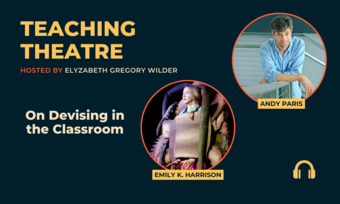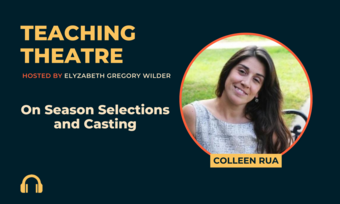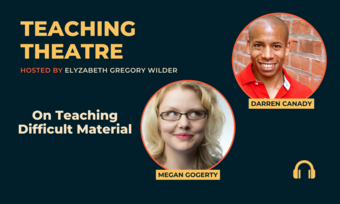In or Out
Demystifying the MFA
A few years ago, both of us decided to apply to graduate school. Though Annah was living in New York at the time and Whitney in Chicago, we had traveled fairly similar paths: internships at large regional theaters, a smattering of freelance writing and directing gigs, and entry level jobs that we were lucky to get but barely paid the bills. We decided to give graduate school a shot despite the prospect of mounting debt, uprooting our lives, and the uncomfortable reality that the acquisition of an MFA is no guarantee of...well...anything. Our pro/con lists were neck and neck, but we both took the plunge.
For both of us, the decision was riddled with apprehension, indecision, and doubt. We were both happy in our mid twenty something lives—why fix something when it’s not, you know, broken? Were we just tired of being stuck at the bottom of the totem pole? (See Annah’s previous HowlRound post, Confessions of a Serial Intern.) Were we just jonesing for a change? We’d both like to think these weren’t the real reasons we went to graduate school. After all, we both wanted to deepen our knowledge in a narrow field, to specialize, to learn things we wouldn’t have the fortitude to learn on our own. Plus, both of us knew and admired people who had nabbed the jobs we wanted after getting their MFAs. We hoped graduate school could be a launching pad to some greener pasture.
Fifty percent of them told her she should absolutely go... The other fifty percent told her she should absolutely not go...
Annah was torn when she got into Columbia’s MFA Dramaturgy program. The prospect of going $80,000 into debt for a degree most people on the planet have never heard of was strange and terrifying. She met with dozens of people to seek advice. Fifty percent of them told her she should absolutely go—how could she pass up an opportunity to pursue higher education at such a lauded university? The other fifty percent told her she should absolutely not go—she was already well on her way to a successful career in the theater, making all of the right connections, and working her ass off. She ultimately decided to go because a) she had nothing else lined up after her internship, b) she was afraid she would regret not going, and c) she was excited about the prestige an MFA from Columbia would give her inside and out of the industry.
After agonizing over her application, Whitney was offered a spot in Yale’s MFA Dramaturgy and Dramatic Criticism program. She extracted herself from friends, family, and a community she loved in Chicago, left her junior staff position at Steppenwolf (to which she was particularly attached), and accepted the fate of a long distance relationship with her partner. The ivory tower better be worth it, she remembers thinking. Yale had its upshots, of course: one of the best schools in the country for what she wanted to study, it promised minimal debt and access to incredible resources. It also offered time and space to read, write, and think—which, after working in an office environment, felt especially luxurious. Yale promised a taste of academia, and a concentrated community of artists who she likely wouldn’t meet if she never left Chicago.
For Annah at Columbia, there was something to be said for remaining inside the professional community in New York—she was able to juggle her academic work and various jobs in the city while completing her MFA. Conversely for Whitney, there was something attractive about being cloistered in New Haven for a few years, a temporary opportunity to study without distraction. Annah’s professional life remained open for business during her years in graduate school, while Whitney is, for the most part, immersed in an airtight, self-sustaining ecosystem.
Conversely for Whitney, there was something attractive about being cloistered in New Haven for a few years, a temporary opportunity to study without distraction. Annah’s professional life remained open for business during her years in graduate school, while Whitney is, for the most part, immersed in an airtight, self-sustaining ecosystem.
While the jury is still out on whether grad school was “worth it” for either of us (Annah just graduated in February, and Whitney still has another year to go), we both agree on one thing: there is a inordinate amount of mystery, angst, confusion and general opacity around the MFA—a kind of “you just won’t understand until you go through it” mentality. That is a huge leap of blind faith that we’re sure most people would rather avoid. We started to wonder: is there any way to shine a light?
When we read P. Carl’s article on graduate school last year, we agreed it was time to have a larger conversation about the MFA: What is the point? Is it worth it? Why do people apply? What are their expectations? Are those expectations usually met, or do they shift? What are the key differences between the various programs? And is there any sane way to demystify at least some part of the process before diving in headfirst?
We both took a lot of people out for coffee before applying for the MFA, so we decided to create a big rotation of virtual coffee dates for anyone toying with going to graduate school. Over the next four weeks, you’ll hear from folks with MFAs in directing, dramaturgy, and playwriting, all of whom are at different points in their post-MFA journeys. Some are fresh off the proverbial boat, and some have been out for decades. Some have continued on the path they intended to travel, others have gone in new directions. We hope this series will illuminate questions and ignite discussion on the current state of the MFA, and help those considering it to make the decision that is right for them.











Comments
The article is just the start of the conversation—we want to know what you think about this subject, too! HowlRound is a space for knowledge-sharing, and we welcome spirited, thoughtful, and on-topic dialogue. Find our full comments policy here
What about interviewing people who chose in the end NOT to get an MFA?
I would like to hear from people with Stage Managing MFAs!
Yes, please! I'm looking at programs in London and am really interested in talking about this.
I am intrigued that Annah's three reasons for pursuing her MFA (a) she had nothing else lined up after her internship, b) she was afraid she would regret not going, and c) she was excited about the prestige an MFA from Columbia would give her inside and out of the industry) did not include "learn from master teachers and grow as an artist." It is my belief that this last should be the primary reason for attending graduate school.
When was reading books on graduate school, they all had tons of info on getting a law degree, business degree, med school, etc. The tone was always positive. In the section on the MFA, it said something like, "make sure you really REALLY want this degree before applying and accepting." The tone was so negative and cautionary. First of all, who really, REALLY knows going into an MFA if it's the right thing to do? That would deter most people right there. Luckily, I didn't listen to that book and got my MFA soon after I graduated college (I worked for one year in between). Getting my MFA relatively young, I was still naive as to how much I would have to pay in loans afterward. I looked at it as just paying another check every month along with rent, Internet, and utilities. If I had been older and wiser and had worked for more years, I might have had more reservations and fear about the MFA and subsequent loans and would have worried more about whether it would be worth it. Six years out, I can say that it has brought me no direct income or jobs but I am so happy that I did it. I would not be the writer that I am otherwise, and that's something hugely important to me that income can't measure. I wish I didn't have loans--I would be able to take more vacations and have an actual savings--but the payments each month also help enforce my commitment to my craft. I'm happy this discussion is being started because I think more people should consider an MFA if it is right for them and not be deterred by any negativity toward the degree.
maybe this is outside the bounds of Howlround, but could we extend the virtual coffee dates to actors as well?
I am one of eight MFA students at The Royal Central School of Speech & Drama. It's the first year of the MFA programs, a one year MA and a second year of independent study and work in the industry. I am in the Creative Producing program and the other disciplines are Writing for Stage, Screen, and Radio and Voice Studies. It's very different from US MFA programs but I'm glad I crossed the pond and made the investment.
Looking forward to hearing more from the American perspective, as I struggled for years to find the right school in the States before taking off for London. I had even dropped out of an MFA program in Dramaturgy because, at the time, it wasn't worth it. So, it'll be interesting to hear more voices in the conversation!
Great idea, well-introduced.
Ya'll. This is awesome. Good on you two, for curating this important conversation.